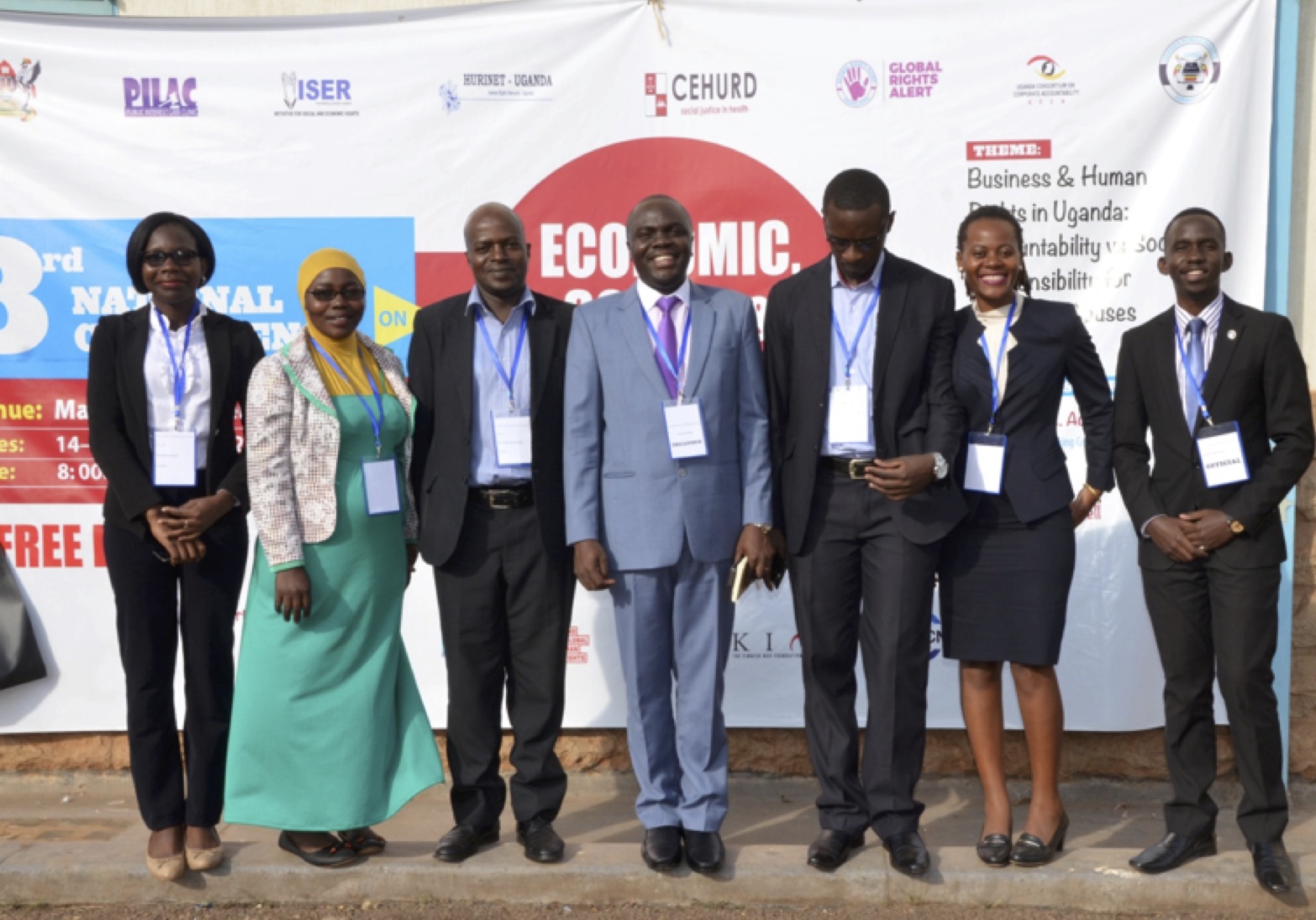The Public Interest Law Clinic (PILAC) of the School of Law, Makerere University together with the Centre for Health Human Rights and Development (CEHURD), the Initiative for Social and Economic Rights (ISER), the Uganda Consortium on Corporate Accountability, (UCCA), the Human Rights Network-Uganda (HURINET-U), The Global Rights Alert (GRA) and the Ugandan Human Rights Commission (UHRC) held the 3rd National Conference on Economic, Social and Cultural Rights at Makerere University Main Hall, under the theme: Business and Human Rights in Uganda: Accountability Vs Social Responsibility for corporate abuse.
The two day conference aimed at initiating and contributing to public dialogue about business and human rights and enhance the need to build structures and frameworks that promote respect and protection of human rights by businesses, as well as ensuring access to remedies in cases of abuses.
The conference brought together representatives from Government Agencies, NGOs’/CBOs, members of the academia, students, participants from the African Continent, representatives from the Diplomatic Missions, Development Partners, corporate entities, the business community, communities affected by actions of Corporations and the general public to discuss, develop structures and frameworks that can boost respect and protection of human rights by businesses.
As the conveners of the conference, CEHURD’s Executive Director Mr. Mulumba Moses gave remarks on behalf of the partnering organisations. In his remarks Mr. Mulumba said , “privatisation has taken over the role of the central government this has seen critical entities like the health sector being taken over by private entities, the private sector has taken over 50% of service provision in the health sector but how far have these gone to ensure that human rights are respected. ”
Dr. Michael Addo a member of the United Nations Working Group on Business and Human Rights,and the key note speaker said, “the topic of conference is timely because of its global significance, there is evidence of advance human rights impact by private actors from the baseline study that was disseminated during the conference.”
He acknowledged the different initiatives that are responding to business and human rights for example the policy framework to protect and respect remedy framework. “These are based on three integrated pillars, the state’s duty to protect human rights by third parties including business enterprises, the responsibility of business to protect human rights and lastly access to effective remedy to those whose rights are violated,” he said.
He called for common understanding and a sense of ownership of what stakeholders are doing in regards to business and human rights and hopes that Uganda adopts the guiding principles.
He explained, that guiding principles on business and human rights where based on the multi stakeholder approach to guide and protect business and human rights. The aim of the guiding principle he said is to provide a universal applicable guidelines that allow governments and companies to apply them in different circumstances taking in account the complexity of tools and processes at their disposal. They are not might to represent a silver bullet solution to the institutional miss alignments in the business and human rights field instead all social actors must do things differently. Considerations of the context of a particular region or country should be done when implementing the guiding principles.
Parallel sessions where held with various panellists sharing incites on issues to do with the state of corporate accountability in Uganda, public private partnerships in delivery of public services opportunity or threat to human rights, accessing health Care services in a commercialised sector to mention but a few.
An engaging parallel session on access to health in a commercialised sector was also spread headed by CEHURD. The session was graced by Prof Ben Twinomujuni, Ambassador Nathan Irumba, Mr. Denis Kibira, Dr. Peter Okwero, Doreen Nambule a representative of Uganda Medical and Dental Practioners Council, Prof John Jean Barya, victims from the community, students, the media and the general public.
In his remarks, Ambassador Irumba stated that the state must be held accountable in ensuring that citizens are able to access health care services.
Dr. Okwero said,” as a country, we need have effective systems, leadership and resources both government and the private sector do not have resources,17% of health services are financed by the government, 34% by other sources and the rest is out of pocket, financed by individuals also he advised that as a country, we to change our attitude, and look closely at taking up health insurance plans. He added, that there is a need to regulate the entire health sector and not only the private sector .
Prof Barya, citied countries like Kenya, Tanzania and Rwanda, whereby in Rwanda community health insurance scheme has been adopted and so, called for Uganda to copy a leaf from such best practises.
Testimonies of victims from the community suffering from the effects of the stone quarrying business where shared during the session. Ms. Maria Kyazike narrated that the community well water has been contaminated because of the stone quarrying process by the Chinese investors in her village.
The conference was insightful and was used as an opportunity to review the status of human rights in Uganda and to set the momentum for discussion on issues related to abuse of human rights by businesses and corporate bodies.
General recommendations that arose from the conference included: the need to implement the UN guiding principles of business and human right, a call for more community engagement in ensuring human rights are protected and respected, A need for Ugandans to demand for their right from the government, a human rights impact assessment carried out mostly for in the environmental sector before any business is accepted to operate, in the health sector and a call for the regulation of the private health care service providers.

